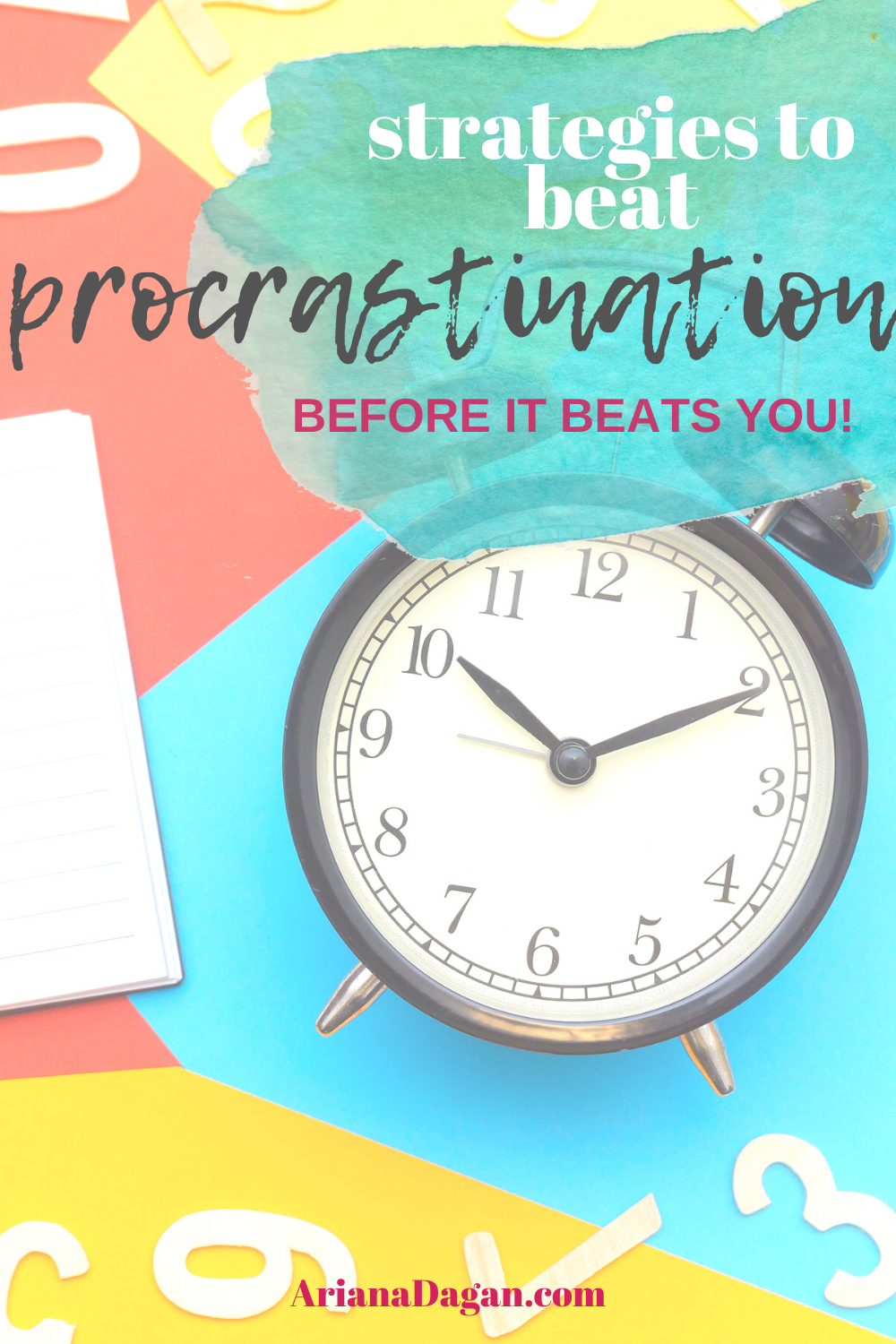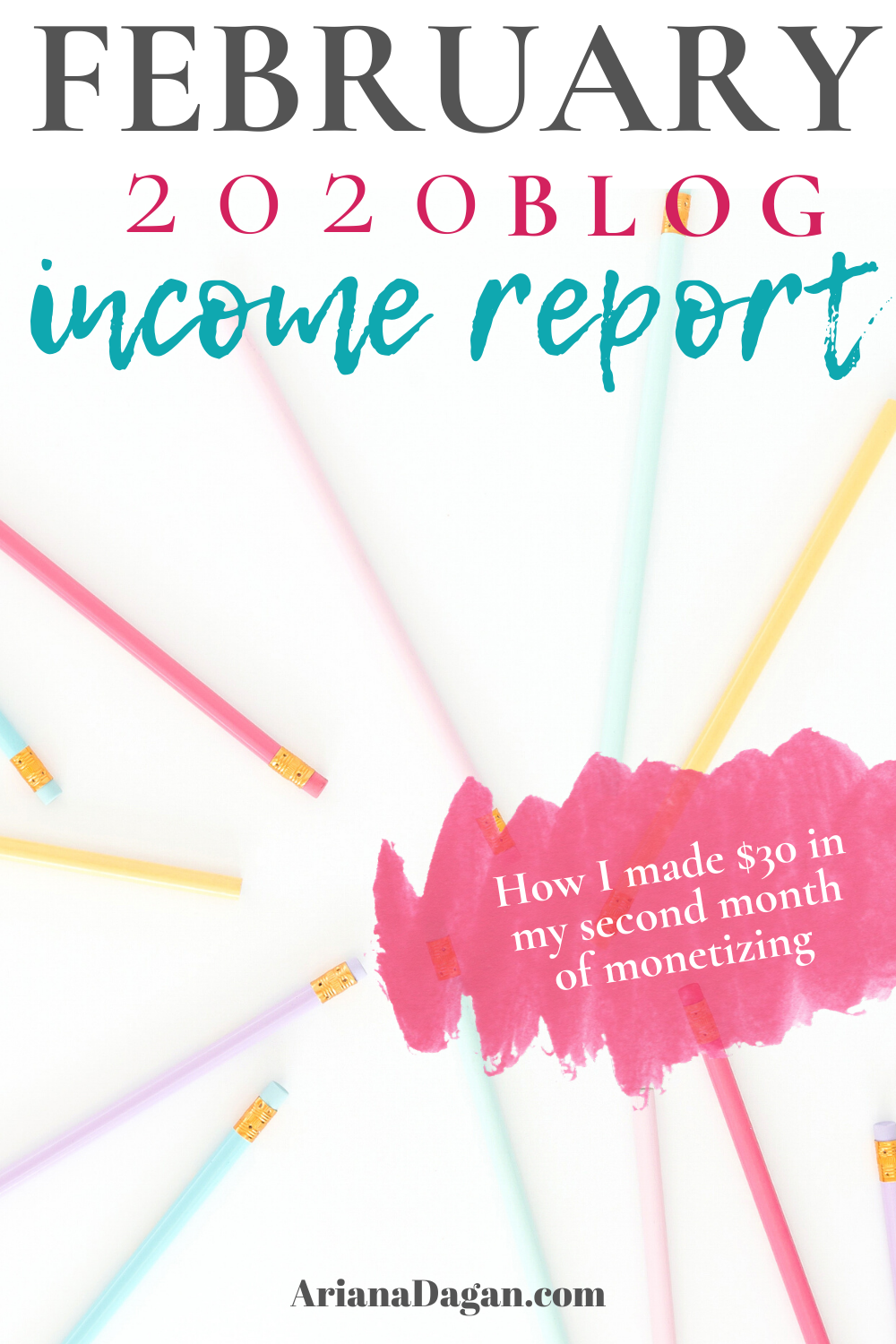This post may contain affiliate links.
 Most people are fairly familiar with good ole procrastination in some way or another. But if you find yourself procrastinating enough its beginning to affect your life, this guide to finally stop procrastinating is for you.
Most people are fairly familiar with good ole procrastination in some way or another. But if you find yourself procrastinating enough its beginning to affect your life, this guide to finally stop procrastinating is for you.
I suffered for years, I was known for waiting until the week of to start my final projects in college. And while I generally pulled off great grades, it’s not a practice I was fond of, nor proud to look back on. Over the years real life brought to my attention how unhealthy this was, and my first business made me realize my clients didn’t deserve procrastination, and something (IE: me) needed to change.
What is Procrastination and Why are you Procrastinating?
Procrastination is defined as the delay or postponement of an action. In short, it is a conscious decision not to do something (yet). It’s often interchanged with laziness, however, there is a very important distinction between the two. The intent. Procrastination is a choice not to do something, yet (IE: the intent to do it exists, eventually). Laziness is an overwhelming desire not to do something at all (IE: no intent to achieve said task). But let’s take it a step further.
The intent is simply a desire. It may be the desire to achieve versus desire not to achieve something, that’s irrelevant. Desire is simply a drive that causes a reaction. So what does this mean exactly? It means an emotion is triggering the drive which in turn triggers the reaction. Often, fear is the emotion that drives us to desire a specific outcome. Fear of failure or fear of success ultimately decides what our intent in a situation will be.
The more important question is, which are you? Afraid of failing or afraid of succeeding?
Both emotional triggers can affect either trigger, and we’ll discuss this a bit further down. In the meantime, keep both questions in mind.
Why is it so Harmful? And Why You Need to Stop Procrastinating!
The answer here may seem obvious, avoiding to do work you need to complete is bad because you may miss important deadlines, disappoint people or lose out on opportunities. But it goes deeper than that. Remember those triggers?
Let’s say you’re scared of failing, so you avoid completing your thesis and miss your deadline, therefore failing. You’ve now reinforced the idea in your mind that you were right to be afraid to fail because now you’ve proven you will. Of course its backward logic on paper, but in our mind? It makes perfect sense, and it’s so easy to slip into this pattern creating a cycle of failure using procrastination as our reaction to the fear.
[irp posts=”2290″ name=”Productivity Roundup: 16 Women Share their Best Tips, Strategies and Tools to Help you Manage Your Workload and Make the Most Out of Your Time”]
You already assumed procrastination was bad, but this pattern doesn’t stick to one specific fear – it begins to spread. Infecting all of our actions, and every time we reinforce it, using procrastination to boost it, we make it stronger. Here’s the crazy part, we’ve only talked about fear of failure. Remember the fear of success? Just as strong.
Imagine you’re afraid of succeeding, and a well-written thesis may mean getting your dream job…but what if you don’t like your dream job? What if you’re not good at it? What if your boss hates you? What if success isn’t what you imagined? So you procrastinate. But you get it done last minute, it’s a half-assed job, not as good as it should have been. You miss out on the opportunity for your dream job when they pass you up for someone with a better work ethic. And you have now reinforced the fear of succeeding by listening to that little voice in your head.
But we’re not done, here’s one more twist for the road. Imagine you’re afraid, it doesn’t even matter what you’re afraid of at this point. But you’re procrastinating, and at the 12th-hour inspiration strikes, you force yourself to do whatever it is you’ve been avoiding. And it works -HOORAH! You’ve made the deadline, you haven’t let anyone down, and not only that but people are impressed by whatever you’ve done. Maybe you’re rewarded with an “A” in school, perhaps a job promotion at work, or an incredible opportunity somewhere in your life. Congratulations, you’ve now reinforced the habit of procrastination, regardless of the fear in the intent in a cycle of self-sabotage.
Stop the Cycle: How to Stop Procrastinating!
If you’re ready to stop the cycle, there is a simple process to do so, but you need to be consistent with it, you need to practice EVERY SINGLE TIME you find yourself procrastinating, and build it into a habit of its own and replace the habit of procrastination with a positive habit. Some personalities are more prone to procrastinating than others, some are better are organizing, but everyone is capable of stopping the cycle of procrastination!
STEP ONE | Admit you’re doing it! Recognize and call yourself out on it. I find it helpful to make a list of tasks or activities I catch myself doing when I’m avoiding doing something I need to be doing. (IE: scrolling through social media, completing busy work as opposed to accomplishing important to-do list items, cleaning, playing mobile games, etc.) be specific on your list. If facebook is your vice, list ‘facebook’ not social media. Put the list on a sticky note near your work station. If you catch yourself doing anything on that list, call yourself out (literally, out loud) and shut it down quickly to stop procrastinating.
STEP TWO | Question why you’re procrastinating. Is it a boring task? A hard one? Tedious? No idea where to start? Be honest with yourself. There is no shame in any of those excuses but you also can’t move forward until you understand why you’re procrastinating. This will take some time getting used to. The first few times you question why you’re procrastinating, you probably will have a difficult time answering it. That’s ok, it will start becoming easier to recognize the signs as you get used to this practice. So go through the list – ask yourself each one below, to begin with. Figure out why before you can move on (and finally stop procrastinating)!
**It’s important to note that sometimes there are underlining reasons for procrastination that aren’t related to the task, for example, procrastination may be a symptom of depression, ADHD, or anxiety. If you believe this may be your case, talking to your doctor is a great place to start in helping you.
Common excuses:
- Task is boring
- Task is too complicated or difficult to understand
- Task is tedious
- Don’t know where to find what I need
- Don’t know where to begin
- Don’t understand the expectations
- Feel overwhelmed by the task
- Afraid of failing
- Afraid of looking ‘dumb’
- Afraid of succeeding
- Too tired
- Waiting for inspiration to strike
- Not enough time for the deadline
- Waiting for help/resources
Sound familiar? This is only the tip of the iceberg for excuses. Go through the list and think realistically which if any, or any additional ones may be contributing to your procrastination for this particular task. When you’re ready, move on to step three.
STEP THREE | Here’s where the fun part comes in. Building effective habits to combat procrastination. It’s important to have the right tools for the job which is why understanding what the job is (IE: why you’re procrastinating in the first place) is so important. Remember, why you procrastinate for one task, may not be the reason you procrastinate on another so its important to build a toolbox of healthy anti-procrastination habits so you can choose wisely when the occasion requires. Let’s look at those common excuses again, and discuss potential ways to combat these excuses:
*Note: the suggestions below should be jumping-off points to stop procrastinating, not necessarily the tool YOU need. Take notes of ideas you like, but more importantly, brainstorm ways that will work better for YOU.
- Task is boring: Not every task we do will be interesting, a great way to make it interesting is to gamify it. Break down a task into smaller pieces, then use reward systems between the mini-tasks. Maybe it’s an M-n-M, maybe it’s refilling your coffee cup, maybe it’s taking a couple of minutes to enjoy your favorite mobile game. Whatever it is, make sure you keep the reward appropriate to the task (IE: don’t give yourself 5 minutes on a game, when each task only takes a minute to complete, instead make yourself complete 5 tasks before taking a 5-minute break, etc.!).

- Task is too complicated or difficult to understand: Complicated tasks are difficult to force yourself to do. Depending on the task, breaking it into smaller pieces may help you get a better understanding of what is expected. However, if you’re not sure how to do that – go back to the task assigner. Ask for clarification. If there is no individual to ask, head to google or youtube for help! Lastly, appropriate Reddit and Facebook groups may hold someone who can answer your questions, get the clarification needed to get you working again!
- Task is tedious: Alternating between fun or easier tasks can make tedious tasks less…well, tedious. If you only have a couple, break them into smaller chunks and alternate so you only have to focus on the tedious part for a short amount of time!
- Don’t know where to find what I need: This can be difficult, the first thing you should do is go back to your assigner of the task and ask. If there is no assigner, google may be your best friend! Refer to ‘task too complicated or difficult’ for more ideas!
- Don’t know where to begin: A large task or project can be difficult to understand at the big-picture level, simply breaking it into smaller pieces (as many as required) can help. It could be the project simply doesn’t have a “must start here” place, and can be started anywhere, or it may be that you can’t see the entrance until it’s in smaller more manageable pieces!
- Don’t understand the expectations: Clarification, clarification, clarification. Go back to the assigner and ask questions! If there is no assigner, say you want to change something on your website and you don’t understand the code – but you’re the assigner, Google, YouTube, Facebook or Reddit groups may be your savior!
- Feel overwhelmed by the task: As previously mentioned, breaking tasks into smaller chunks can help with the feeling of being overwhelmed. But when that’s not enough, I like to do a 5-minute free-write. Set a timer, grab a piece of paper and empty your head. Get every word out on paper. You don’t have to complete sentences, nothing needs to make sense. Simply just write the first word that comes to mind. Once the 5 minutes are up, throw the paper away and then begin your task. You’ll feel so much more refreshed and ready to tackle the project!
- Afraid of failing: This is personal to an individual. You need to understand why you’re so afraid of failing, and what does this task specifically have in common with that fear. Generally, if you can disconnect the task with the fear, you can move forward with the task. Imagine your goals, this is where a positive mindset can come in handy. Practice daily affirmations, visualize your goals, and manifest NOT failing!
- Afraid of looking ‘dumb’: A lack of self-confidence can affect everything you do. Set yourself up for success by practicing confidence-boosting actions each day. It’s important to figure out what motivates you. Sometimes its tough love, sometimes its gentle love. Knowing what works, will help you learn to talk to yourself in a more healthy and productive manner. Ultimately, it’s up to you to prove to yourself that you AREN’T dumb!
- Afraid of succeeding: Fear of succeeding works much like the fear of failing. You need to disconnect the fear from the task. Imagine your goals, visualize them being accomplished, visualize the consequence of them being accomplished. Are you comfortable with this? What can you do to make it comfortable? Sometimes this fear manifests because we ultimately aren’t comfortable with the outcome of succeeding and that means we need to tweak our goals. Sometimes the fear comes because it is truly change itself that we are afraid of. Figure this out so you can build tools and habits to disconnect from the current task and move forward!
- Too tired: Tired could mean a lot of things. Did you get good sleep the night before? Could a powernap get you through? Need a coffee or an energy drink? Could a bout of yoga or a quick run wake you up? Knowing why you’re feeling tired will help. You may instead feel exhausted about the task because its too big, too complicated, or too tedious – check the aforementioned excuses for specific ideas!
- Waiting for inspiration to strike: Ahh good ole inspiration. Our muse. Our magical invisible buddy that has his own sense of time. Here’s a tip. Fire him. He works on his own schedule with his own agenda. You have your own schedule with your own agenda. Find inspiration in life around you, not in a mythical being. I know this sounds easier said than done. Show up each and every day accomplishing your tasks. Don’t rely on someone else to bring the inspiration. Writing each day makes you a stronger writer, not waiting for the days when “inspiration” strikes. Accept that you are responsible for your own inspiration and work for it each day and you will begin to create your own! Truly! The more we rely on a muse, the less our minds create inspiration. Once we start using ourselves as the inspiration again, we begin to create more!
- Not enough time for the deadline: This is tough and situationally specific. Did you procrastinate too long? Was the original deadline not far enough out? Can you get it pushed? Can you cancel some tasks or plans to make this deadline work? What happens if you miss the deadline? How can this be avoided in the future? You will need to ask yourself each of these questions to be able to properly build tools and habits to combat this one!
- Waiting for help/resources: What can you do in the meantime? Can you pester the people you are waiting for? Can you break down tasks, outline or assign to people while you wait? Can you find resources in a different place you can get to quicker? More often than not there is something we can do while we wait, it’s just easier to not and blame someone else for the procrastination!
Set Yourself Up for Success and Stop Procrastinating!
It doesn’t matter what tool you have in your back pocket to combat procrastination if you’re not setting yourself up for success, to begin with! So how do we do that? It’s easy now that we recognize some of the common excuses we come up with!
Take another look through that list, which ones did you recognize in yourself? How can you apply these habits to your life BEFORE you start a task to minimize its effects once you dive into a project? Making these into habits can set you up for success before you even dive into a project to stop procrastinating before you start!
A few suggestions:
-
- Minimizing distractions before you begin: turning off the TV, working somewhere quiet, leaving your phone in a different room, etc.
- Begin your task well-rested, or with a cup of coffee by your side
- Make sure you understand what is required of you before you try to begin the task. Gather any resources or information needed to complete, and ask for clarification before you attempt to jump in
- Read The Compound Effect by Darren Hardy, I promise you this book will change your life!
- Break large or complicated tasks into smaller portions before you begin
- Try a free write before you sit down to focus on a task. Grab a piece of paper, set a timer for 5 minutes and just write anything that comes to mind. Don’t worry about sentences, or making sense. You can throw the paper away when the timer goes off. This works to help you concentrate by getting distracting thoughts out of your head before they start distracting you! For more tips, you should absolutely read The Artists Way or grab the Morning Pages Companion Guide!
- Practice a positive mindset each and every day, when fear strikes you’ll already have the positivity you need to battle it! [TIP: Sign up for my newsletter to receive 365 positive affirmations to get you started!]
Remember, generally a habit takes 21 days to establish, and 30 days to break. Procrastination is a lifetime of bad habits built up so it will take time to break the cycle and establish healthy new ones. Take it one day, and one task at a time, and before you know it you’ll begin seeing changes in your work style and finally stop procrastinating on important tasks!
What other common excuses can you add to this list? What types of habits and tools can you think of? Share your ideas with other readers below so you can help others stop procrastinating today!









This is such a motivating and inspiring post on how to stop procrastination. Definitely every single person can benefit from reading!
Thanks for the tips on how to finally stop procrastinating. I am a huge procrastinator.
I totally needed to read this. I’m also pinning to reference later. Thank you for posting. Procrastination is a major problem of mine!
If I am honest with myself, I would say I somewhat struggle with procrastination but it is something I am working on. I feel I would be a lot more productive and get so much done if I use Some of these Strategies you suggested.
I’ve been putting off a massive project but have newly committed myself to worming in it for at least 15 minutes 4-5 days a week!
I need this so much! I try so hard not to procrastinate, and always fail. Thanks for the tips.
I have a bad habit of procrastinating when I’m not sure of what I’m doing or am fearful of it so thanks so much for these tips which I’m going to try!
My excuse more often than not is tiredness and my favorite and most effective way to stop procrastinating is to form habits!
Thank you for this, I’ve been such a procrastinator and really need to kick this bad habit and do better. I think these tips that you’ve outlined here will really help and I can’t wait to put them into action.
Procrastination has always been a huge problem of mine. It is something that I struggle with on most days. I know that procrastinating on things I need to do just causes me even more stress, but yet it isn’t enough to get me to do what I need to do. I bookmarked this post and will be referring back to it so that I can work on no longer procrastinating. Thanks so much for sharing!
So important to figure out your “why”!
This post is spot on. I work really hard to not procrastinate because in the end I feel worse than before about it getting my task done. Thanks for these tips!
This is great timing becuase I have an important task that I should’ve done yesterday! Today is the day. No more procrastination x
Ooooh this is good! And boy do I need it. I have such a fear of failure which is why I don’t set goals. And I drag my feet on so many things although I don’t want to. I hate it. I love how you break down what procrastination is versus being lazy. And I’m thankful for the tips you have to overcome. I like the one about breaking it down into small parts. That seems to be attainable to me. Thank you!
I’m already at step 1. I know I’m a procrastinator. I’ll definitely be looking at these steps this year. It’s my sincere desire to break out of this vicious cycle of procrastination.
Thankfully, I enjoy getting things done super early whenever I can. 🙂 However, I have many people close to me who love to wait until the last minute, which drives me bonkers. I am sending them here…for your advice! 🙂
These are some really great tips! I try really hard not to be a procrastinator, but it definitely creeped it’s way in over the holidays. I’m getting on track for a strong and productive new year!
This is so true! I struggle with add symptoms, I really like the idea of gamifying boring tasks. I turn cleaning the house into a calorie burn session. I also like your suggestion to reward yourself for completing tasks. thanks, for this article!
I try really hard not to procrastinate but sometimes there’s just too much on my plate at one time so I always end up procrastinating on the things that I really don’t want to do. Either they take too long or they are really boring! I’m trying to work through my to do list and if I can put aside a few easy things to do later on and force myself to get done the 1 thing that I’m likely to procrastinate on, it seems to help. I know in my mind that those other few things are quick and easy so then I’m motivated to get them done after I finish the other stuff.
I can definitely relate to this post. I have always struggled with procrastination even though I tend to get a lot done. If there’s something that I don’t want to do I’ll keep putting it off. I’ve tried to tackle this by adding it to the top of my to do list – sometimes it works sometimes not. I like your ideas too!